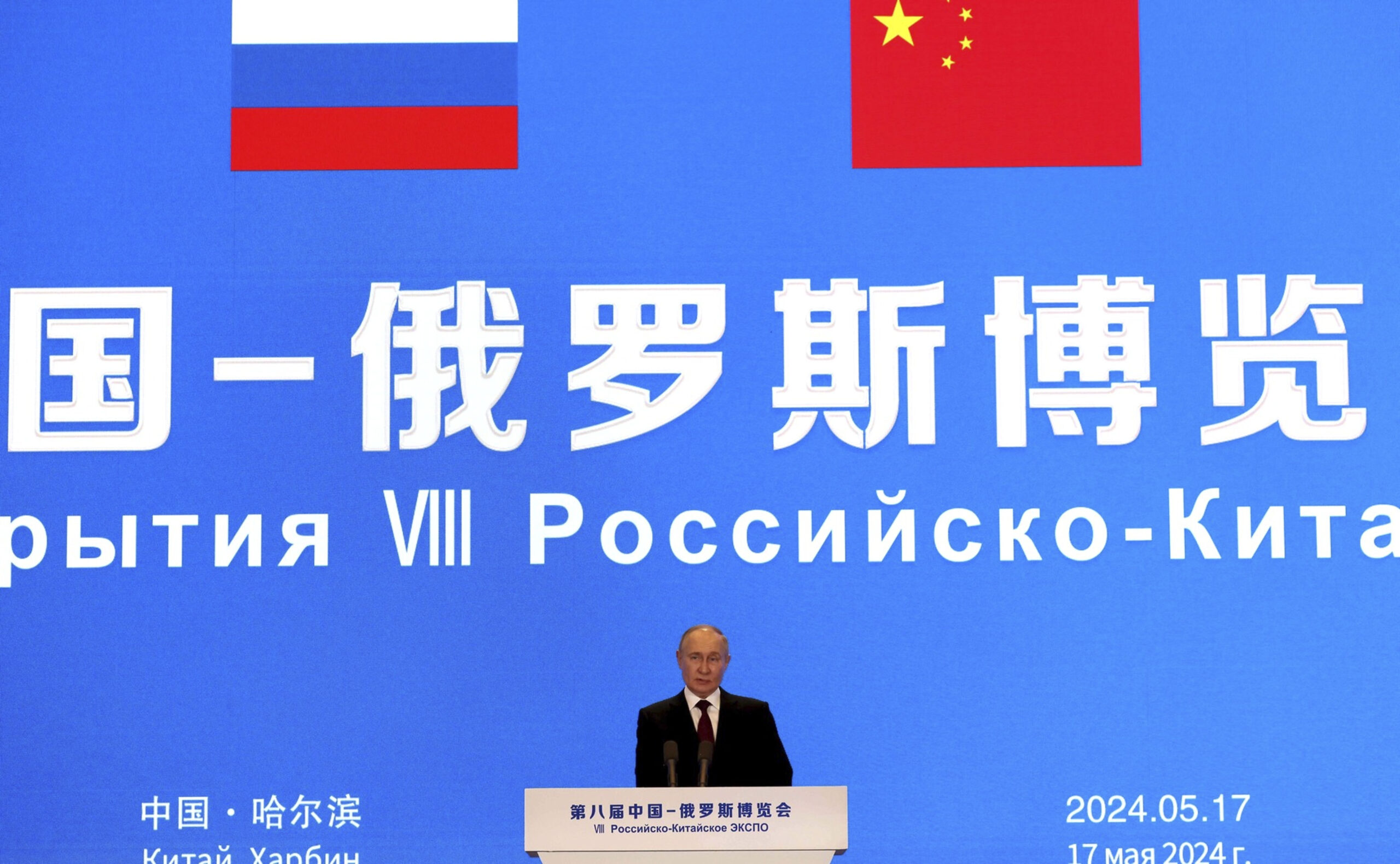In 2013, Xi Jinping officially became President of the People’s Republic of China. In the course of these eleven years, he has held more than 40 meetings with Vladimir Putin. The media often claim that the two leaders have developed close relations, and both Putin and Xi Jinping confirm this. Without questioning the presence of friendly ties, things can be explained much more simply, namely by referring to similar political regimes. In this text, we will examine the topics the two leaders communicate on and why Russia and China have managed to build a political dialogue, while Ukraine brings diplomacy with China into the public sphere.
Russia-PRC: Key topics for political dialogue
Let us analyse the main topics discussed by the leaders of the two countries during Vladimir Putin’s official visit to China on 16−17 May 2024 to understand what the two autocrats focus on. Their attention was concentrated on three topics: foreign policy coordination, military-technological cooperation, and oil & gas projects.
Coordination of foreign policies was publicly reflected in the joint statement on the deepening of comprehensive partnership and strategic cooperation. The document signed at the end of the 16 May meeting lists almost all regions of the globe, major international organisations and foreign policy issues where there are no fundamental disagreements between Russia and China.
The military-technological cooperation is the next important point in bilateral negotiations. Since February 2022, military-political contacts have continued with the same (or greater) intensity, and so have joint military exercises. According to Vasily Kashin, director of the Centre for Complex European and International Studies at the Higher School of Economics in Moscow, the defence industry and military-to-military relations are «among the most developed areas» of Russian-Chinese relations. At the same time, China’s arms imports have shrunk by 44%, mainly as a result of Russian-supplied weapons being replaced with locally produced systems. The focus is likely to shift gradually from arms sales to the development of military technologies. Negotiations of this kind are confidential, and the volume and dynamics of this process cannot be estimated yet.
The third topic, i.e. oil and gas supplies, turned out to be somewhat more complicated. Oil supplies continue to grow and, according to Russian Deputy Prime Minister Alexander Novak, China’s share in exports of oil and oil products from Russia was 50% in 2023, while energy cooperation between the two countries reached a historical high. The signing of the agreement on the construction of the Power of Siberia-2 gas pipeline could have become an important milestone but Alexander Novak noted that discussions on the contract are still underway.
Notably, all three issues listed above are under the personal control of both Vladimir Putin and Xi Jinping. Indeed, autocratic minds think alike.
Ukraine and China: Why is political dialogue still not established?
The most important hindrance in dialogue attempts is related to the structural differences between political regimes. An effective interaction with an autocracy can only be established by another autocracy or a country with strong political institutions.
On 24 November 2023, the Ukrainian ambassador to China Pavlo Riabikin said in an interview that «several powerful Russian media outlets have correspondent offices in China, while Ukraine only has one journalist sent by Ukrinform. Russian media with a powerful Chinese-language segment have attracted a large Chinese audience, easily conveying their narratives to the Chinese population. The Ukrainian media, on the other hand, do not have Chinese-language versions.»
According to Riabikin, the Embassy of Ukraine in China implemented a number of projects in 2023 with the intention to disseminate objective information about the events in Ukraine for the Chinese audience, which helped to increase the number of followers of the Embassy’s account in Weibo, the Chinese social network, and drove a tenfold increase in the number of views of its posts.
What shines through the ambassador’s reasoning is that Ukrainian diplomacy is working in China using the same methods that it has customarily used when dealing with democratic societies. Indeed, in countries with democratic institutions, Ukraine has successfully managed to attract the attention of civil society through the mass media, bloggers, social media posts and numerous campaigns in support of those affected by Russia’s full-scale military invasion. The attention and support of civil society and public institutions naturally put pressure on the political class, promoting the idea to increase economic and military-technical support for Ukraine.
In contrast, the sympathies of Chinese public do not directly translate into the political, economic and military decisions adopted by the Chinese political leaders. Chinese public opinion is controlled by the Chinese media, which is why any appeal to the public is a waste of financial resources. The influence of the media on autocracies is generally exaggerated. China’s political course is determined by a much more complex set of factors than publications in independent media or the pressure of international community exerted in social media. Propaganda is controlled from a single centre and no foreign alternatives (even from friendly countries) are permitted in the information space.
How to communicate with China?
The only effective strategy for resolving issues in relations with China is to hold face-to-face talks with President Xi. This is the underlying mechanics of autocracies. This strategy seems to have been adopted by European leaders and the United States. In November 2022, German Chancellor Olaf Scholz was the first European leader to visit China since the start of the COVID-19 pandemic. In 2023, China was visited by Spanish Prime Minister Pedro Sanchez and French President Emmanuel Macron. Xi Jinping also received the President of the European Commission Ursula von der Leyen, European Council President Charles Michel and High Representative of the European Union for Foreign Affairs and Security Policy Josep Borrell, all of whom went to Beijing. Recently, visits to China have also been paid by high U.S. officials: U.S. Secretary of State Anthony Blinken and U.S. Treasury Secretary Janet Yellen.
The last telephone conversation with Volodymyr Zelensky was held by Xi Jinping on 26 April 2023. To date, this has been the only communication between Zelensky and Xi after February 2022. While those talks did not fundamentally change the political interaction between the two countries, the topics discussed in that conversations were mentioned by Zelensky on 2 June 2024 in his statements at the Shangri-La Dialogue forum in Singapore: «We do not expect military support from China. We have never asked for it (…) But we do not expect China’s defence support to Russia. This is what we discussed with the Chinese leader on the phone. He promised that China would stay on the sidelines, and would not support Russia with weapons.»
According to Bloomberg, Chinese government agencies ignore most of the requests made by Ukraine’s ambassador extraordinary and plenipotentiary envoy to China Pavlo Riabikin. This was also confirmed by Zelensky in Singapore on 2 June: «We repeatedly endeavoured to meet with Chinese representatives, including Mr. Xi. Unfortunately, Ukraine does not have strong ties with China because China does not want it.» Zelensky added that he did not meet with any Chinese officials during his stay in Singapore.
However, it is noteworthy that according to the National Customs Authority of Ukraine, China was Ukraine’s main trade partner in 2023. Based on the results of Q1 of 2024, China is also the leader in terms of trade volume. In the first four months of 2024, Ukraine imported USD 4.2bn worth of goods from China and USD 2.3bn worth of goods from Poland. Ukraine’s largest export destinations were Poland (USD 1.3bn) and China (USD 1.2bn). Accordingly, China and Ukraine have no visible problems in economic terms.
Global Peace Summit
On 26 May, in a video message recorded at the site of a printing plant destroyed by a Russian air strike in Kharkiv, Ukrainian President Volodymyr Zelensky urged Joe Biden and Xi Jinping to come to the conference in Switzerland in June: «I call upon the world leaders who have so far been on the sidelines of the global effort to prepare the peace summit: President [Joe] Biden, the leader of the United States, President Xi [Jinping], the leader of China. […] Please show your leadership in bringing peace: real peace, not just a pause between air strikes.»
A politician and a talented orator, Volodymyr Zelensky has publicly addressed Xi Jinping personally for the first time, encouraging real political action rather than symbolic appeals. Ukrainian diplomacy has failed to influence China ‘from within’ – Chinese public opinion continues to be influenced by the Chinese government.
Earlier, Beijing announced that a Russian delegation should also be invited to the peace conference, while Li Hui, Special Representative of the Chinese Government on Eurasian Affairs, held the third round of shuttle diplomacy on the political settlement in Ukraine. From 3 to 9 May, he visited Turkey, Egypt, Saudi Arabia and the UAE. Before that, he also exchanged views with officials from Brazil, Indonesia, South Africa, Kazakhstan and other countries. Nevertheless, Li Hui’s non-public shuttle diplomacy has not produce visible results.
Previously, Volodymyr Zelensky announced that the conference would discuss three topics: energy security and nuclear security; free maritime traffic; and prisoner exchange (exchange of ‘all for all’ plus the return of deported children). Such a narrow range of issues is not accidental: it allows to involve as many countries as possible, including China, since the discussion of such topics does not contradict the current position taken by the Chinese leadership. Citing an unnamed source, Bloomberg reported that one of the goals of the summit would be to discuss how Russia could become involved in the peace process.
On 3 June 2024, at a regular press conference, the spokesperson for the Chinese Foreign Ministry Mao Ning responded to Ukrainian President Volodymyr Zelensky’s accusations that Beijing was helping Moscow to disrupt the Global Peace Summit in Switzerland: «China believes that it is essential to support all efforts conducive to a peaceful settlement of the crisis. From the very beginning, we have attached great importance to Switzerland’s organisation of the summit on peace in Ukraine and maintained close communication on this issue with Switzerland, Ukraine and other stakeholders. China has repeatedly stressed that an international peace conference should meet three important requirements: recognition by Russia and Ukraine, equal participation of all parties, and honest discussion of all peace plans. In China’s view, the meeting does not yet fulfil these three criteria, which is why China will not be able to participate. Let me emphasise that China’s position on the peace conference is honest and fair. Our position is not against any party, and certainly not against this particular Summit. China’s decision to participate is based solely on our assessment of the summit itself, and we believe that the relevant parties can understand our position.»
We have found no previous examples of any country making a public request to China to resolve a military conflict. China prefers to solve problems bilaterally and non-publicly. However, drawing on the existing moral capital, Ukraine can influence China’s image and its reputation in the world, and these actions are already more difficult to control.
Can Ukrainian diplomacy, and Volodymyr Zelensky personally, discredit China’s foreign policy? Or should the public appeals to President Xi Jinping be seen as the last attempt to invite China to enter the dialogue? Would this not result in further exclusion of China from even potential participation in peace talks?
To date, the most effective methods in dialogue with China have consisted in either threats of secondary sanctions (USA) or direct communication with President Xi (Putin, Macron, Scholz). Volodymyr Zelensky is trying to find yet another way of communicating with China, but its effectiveness is still very much under question.










